Anyone who's spent time with women's media is well acquainted with Jezebel, the fun, smart and appropriately snarky website started by Anna Holmes in 2007. The goal, according to Holmes, was to appeal to female readers without talking down to them. It quickly became clear that there was a strong desire for this type of content, and she and her staff ended up dominating the lady blogosphere.
After years of editing the site, Holmes was burnt out and decided that it was time for a new project. Enter The Book of Jezebel , available Oct. 22, which was written by a range of contributors and edited by Holmes. "I like sitting and reading the dictionary so I got the idea to do a reference book, a sort of encyclopedia of the world according to the sensibilities of the site," Holmes told The Huffington Post earlier this month. The book, which includes entries that range from "indulge" to "Elizabeth Warren" to the "Hyde Amendment," serves as a sort of witty encyclopedia of all things lady-related. If these short posts are a sampling of smart womanhood, we're sold.
Here are 26 A-Z entries from The Book of Jezebel:
Are You There God? It’s Me, Margaret
I must, I must, I must increase my bust! (See also BLUME, JUDY)
Bikini Kill
Band. Formed in 1990 in Olympia, Washington, Bikini Kill became the most famous band to emerge from the feminist punk rock movement known as riot grrrl. While riot grrrl itself had a wide diversity of sound, Bikini Kill rose to prominence by playing hardcore, an abrasive and usually heavily masculine kind of punk rock, made more famous by bands like Minor Threat and Black Flag. Over a series of EPs and two albums, "Pussy Whipped" and "Reject All American", lead singer Kathleen Hanna (who also published feminist zines including one titled "Revolution Girl Style Now") and members Kathi Wilcox, Tobi Vail, and Billy Karren produced acerbic and often catchy songs denouncing condescending men and sexual violence and celebrating female displays of strength and resistance. The band helped coin the riot grrrl slogan “Girl power!” only to see it co-opted by mainstream bands such as the Spice Girls, who drained it of much of its feminist meaning. (Fun fact: Kurt Cobain of Nirvana came up with the title “Smells Like Teen Spirit” after reading graffiti Hanna had spray painted on the wall that said “Kurt smells like Teen Spirit.”) (See also HANNA, KATHLEEN; ZINES)
Claus, Mrs.
Long-suffering wife of a man who takes all the credit. Wasn’t even featured in the movies until the 1960s. We picture her at night, kicking away anxious elves, downing a glass of merlot, and listening to Tammy Wynette.
dude
Slang term for a person. Often associated with Californian surfers, stoners, and fraternity brothers, dude has yet to achieve the gender-blind status achieved in recent years by guys and is usually applied only to boys and men. Its proudest moment as a noun came in 2009, when MSNBC host Rachel Maddow, a Californian, got frustrated in an interview with an antigay researcher who denied having ever made one particular homophobic claim. Maddow said, with audible exasperation, “I’m reading it from your book, dude.” Its least proud moment came in the form of the 2000 movie "Dude, Where’s My Car?" (See also MADDOW, RACHEL)
Ephron, Nora (1941–2012)
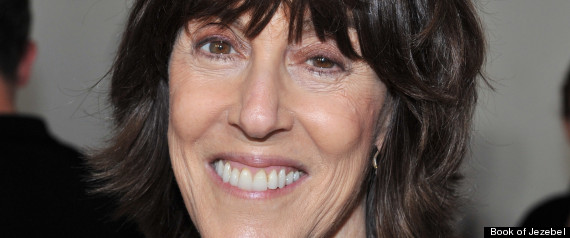
Beloved and decorated writer and director. Got her start as a journalist in the 1960s (after an internship in the Kennedy White House), covering politics, fashion, and everything in between for the New York Post, Cosmopolitan, and Esquire. Married journalist Carl Bernstein in 1976 (her first screenwriting gig was helping to rewrite the script of "All the President’s Men," the movie about how Bob Woodward and Bernstein uncovered the Watergate Scandal). Divorced Bernstein while pregnant with the couple’s second son after discovering he was having an affair with a family friend; her devastation and recovery was chronicled in her bestselling 1983 roman à clef, Heartburn. Ephron’s illustrious career was a testament to the power of storytelling, whether on-screen ("When Harry Met Sally," "Sleepless in Seattle," "You’ve Got Mail," "Julie and Julia"), onstage ("Love, Loss, and What I Wore"), or on the printed page (Crazy Salad, Heartburn, I Feel Bad about My Neck, I Remember Nothing). In I Remember Nothing, Ephron wrote a list of things she would and would not miss about life, when it ended. On the “won’t miss” list: “Polls that show that 32 percent of the American people believe in creationism,” “mammograms,” and “Panels on Women in Film.” On the “will miss” list: “My kids,” “waffles” and “the concept of waffles,” and “Pride and Prejudice.”
Fab, fabulous
An art and state of being that no one can agree on how to achieve. As a quality, fabulousness is easily overdone, leading to campiness or (heaven forbid) tackiness. This is separate and distinct from fabulosity, which is either the default state of Kimora Lee Simmons or an alternative universe swathed in cheetah print.
G-spot
Highly sensitive area either inside the vagina, inside some vaginas, or inside no vaginas, depending on whom you ask. Named after German gynecologist Ernst Gräfenberg. Everyone started talking about it in 1982, when Alice Kahn Ladas, Beverly Whipple, and John D. Perry published The G Spot: And Other Recent Discoveries about Human Sexuality. Thirty years later, we’re still arguing over whether it exists.
heterosexuality
1. Being sexually attracted to people of the opposite gender, assuming there are only two. 2. What everyone in this culture is assumed to be unless they have a nonstereotypical gender presentation and/or constantly remind people that not everyone is heterosexual. 3. A sexual orientation. No more, no less.
Inhibitions
Things that usually keep us from dancing on bars, punching people we have to share public transportation with, telling our bosses what we really think of them, and wearing pajama bottoms to cocktail parties. Things that sometimes keep us from approaching attractive people, asking for raises we deserve, and otherwise taking risks that might pay off big in the long run.
Jane magazine
Lady mag launched in 1997 by Jane Pratt. Framed as the older sister to Pratt’s late, great Sassy, Jane never quite managed to elicit the same kind of devotional love from its readership, and it folded in July 2007.
Knowles, Beyoncé (1981–)
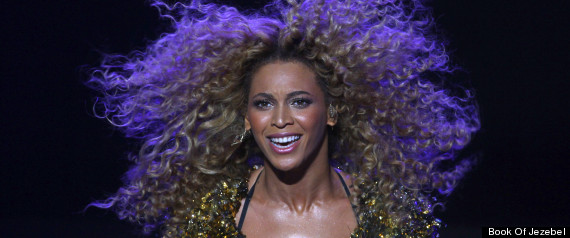
Singer, actress, designer, entrepreneur. Buoyed by an amazingly strong voice and persistent, costume-designing stage mother, Beyoncé Knowles led R&B girl group Destiny’s Child to a reported 50 million record sales worldwide. She then moved on to an insanely successful solo career, a pretty damn successful acting career on the side, a collaboration with Lady Gaga, and marriage to Jay-Z, with whom she produced a darling baby girl named Blue Ivy. If she has not actually achieved human perfection yet, she’s working on it. In the meantime, she’s certainly the closest thing we have.
ladies
Your grandmother preferred being called a “lady” because it implied refinement. Your mother preferred to be called a “woman,” because she felt the distinction between “lady” and “woman” was dumb, old-fashioned bullshit. You started ironically referring to yourself and your female friends as “ladies” somewhere in the late nineties or early aughts, at first because you felt weird referring to yourself as a “woman,” and then later out of habit. By the time your daughters are grown, it will seem like a dumb, old-fashioned bullshit term again.
Manic Pixie Dream Girl
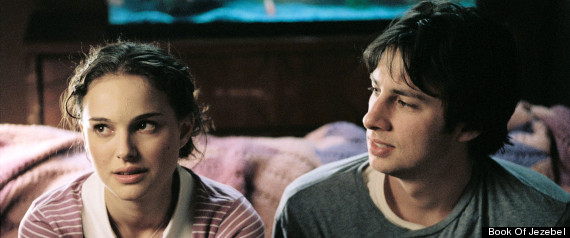
Term coined by Onion A.V. Club scribe Nathan Rabin to describe a deeply annoying female trope in film: “that bubbly, shallow cinematic creature that exists solely in the fevered imaginations of sensitivewriter-directors to teach broodingly soulful young men to embrace life and its infinite mysteries and adventures.” Most irksome example: Natalie Portman’s character in "Garden State," who ruined The Shins for everyone.
negotiation
In the workplace, an excuse lobbed at women who do not receive equal pay to men—“Women don’t ask for more money!” (In fact, it’s been proven that women perceived as pushy have been denied raises.) In the bedroom, an excuse lobbed at women whose sexual boundaries are violated—“She says no, but she means yes” (when in fact it is incumbent upon the assailant not to assault a partner in the first place).
old
Any woman who no longer buys Clearasil on the regular, according to Hollywood. (See also ACNE)
Powerpuff Girls
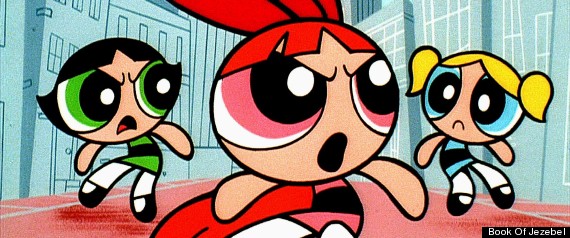
Animated crimefighters. The Cartoon Network’s Blossom, Bubbles, and Buttercup were the late 1990s’ and early 2000s’ answer to "Charlie’s Angels." Apparently created in a lab experiment gone awry, they were, according to the show’s theme song, made out of “Sugar, spice, and everything nice / These were the ingredients chosen / To create the perfect little girls.” (They were actually created in 1991 by animator Craig McCracken while he was a student at CalArts.) “To their loyal fans and amused admirers, these kindergarten rabble-rousers represent something bigger than the next Hello Kitty,” wrote Heather Havrilesky for Salon in 2002. “For hyper-analytical adults and avid third-wave feminists, they’re animated proof that strong female characters can kick ass and take names without compromising their femininity.” Havrilesky also pointed out that “it could be argued that their popularity may not reflect a dramatic shift in our society’s view of gender roles, but rather our inability to stomach female anger unless it’s sugarcoated in cuteness and scored with a pervasively chirpy, nonthreatening tone.” (See also SUGAR AND SPICE)
queen
1. Female monarch. 2. British rock band fronted by the late Freddie Mercury. 3. Occasionally derogatory term for a flamboyant gay man. 4. Name beleaguered women give themselves when their shitty husbands and ungrateful kids fail to appreciate their inner royalty.
The Rules
Bestselling 1995 guide to female behavior that promised to find a woman a husband within a year—a year of smiling in public while holding a club soda, never calling a man, timing phone calls to end after ten minutes, delaying sex for months of dating, never accepting a weekend date after Wednesday, rarely accepting a weekday date, faking plans, and only speaking when spoken to—a romantic strategy predicated on projecting an image of—but not actually embodying—confidence, independence, and self-respect. Written by Sherrie Schneider and Ellen Fein.
"St. Elmo’s Fire"
Sole “Brat Pack” classic not directed by John Hughes that concerns a bunch of recent college graduates moping about how shitty real life is. Rob Lowe wears a dangly earring and plays jazzy saxophone. Andrew McCarthy thinks that “love is just an illusion.” Judd Nelson has not yet grown into his nostrils. Mare Winningham gives her virginity away as a “present.” Demi Moore loves cocaine and requires incessant rescuing. Emilio Estevez and Ally Sheedy are there, too. An actual quote: “Please…I’m with these Arabs and they’ve been forcing me to do coke all night. And I only understand a little Arabic, but I’m sure I heard the words for ‘gang bang’ and ‘white slavery.’ Please get me out of here.”
therapy
Emotional work with a trained medical doctor, psychologist, or social worker. Or masseur, aesthetician, psychic medium, Reiki healer, crystals expert, Ayurvedic consultant, or shopping buddy.
unfriend
Harsh sentence for someone who has wronged you and a necessary protective strike in the healing period after a bad breakup. (The longer you wait, the more photos you’ll have to overanalyze of your ex doing body shots with someone in a tube top.) (See also TUBE TOP)
virginity
Condition of a person who has not yet had sex. Irrelevant to pretty much everything, but highly valued in many cultures, at least in women.
"Waiting to Exhale"
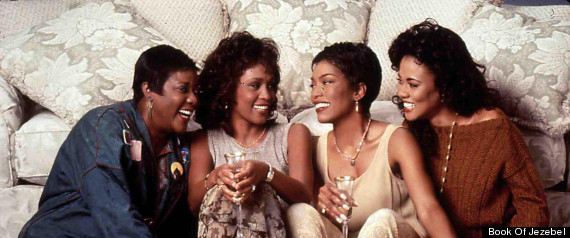
Novel by Terry McMillan published in 1992; later, a movie directed by Forest Whitaker and starring Angela Bassett and Whitney Houston that was called “a social phenomenon” by the L.A. Times because of its predominantly black and female cast. “Despite themselves, the four black women whose turbulent love lives are explored with a salty good humor…all subscribe to the myth of a knight in shining armor,” wrote Stephen Holden for the New York Times. “By the end of the film…one of the four actually finds her Prince Charming, and another has established a long-distance correspondence with someone who shows distinct Mr. Right potential.” However, notes Holden, “these princely paragons are shining exceptions” in a story that portrays men as dogs. Oh, and the soundtrack! A tour de force with all of the biggest divas of the time, including Houston herself, as well as Toni Braxton, TLC, and Mary J. Blige. (See also HOUSTON, WHITNEY)
XXX
According to Brewer’s Dictionary of Phrase & Fable, an X scrawled on a beer cask used to indicate that the brewer had surrendered the sufficient duty to the government for selling the stuff. Tripling the boozy signal evolved into shorthand for all things extreme—scrawled on a jug, it’s a stiff alcoholic drink (maybe moonshine); a winning line in the game of tic tac toe; shorthand for kisses (or is it hugs?); relayed over a radio signal, it’s a distress call just short of SOS; affixed to film, it’s hardcore porn.
Youth
Expected of women throughout their life cycle.
zits
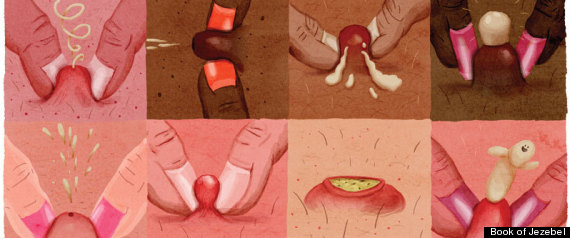
1. Acne. 2. Device in the classic, oh-my-fucking-God, how-did-no-adult-ever-stop-me-from-playing-this-with-all-of-my-friends-at-age-nine, it-is-so-hilariously-deeply-misogynist teen parlor game Girl Talk, wherein a player would be forced to place a small red dot sticker on her face in order to register her lack of worth as a romantic partner, creative talent, or friend.

After years of editing the site, Holmes was burnt out and decided that it was time for a new project. Enter The Book of Jezebel , available Oct. 22, which was written by a range of contributors and edited by Holmes. "I like sitting and reading the dictionary so I got the idea to do a reference book, a sort of encyclopedia of the world according to the sensibilities of the site," Holmes told The Huffington Post earlier this month. The book, which includes entries that range from "indulge" to "Elizabeth Warren" to the "Hyde Amendment," serves as a sort of witty encyclopedia of all things lady-related. If these short posts are a sampling of smart womanhood, we're sold.
Here are 26 A-Z entries from The Book of Jezebel:
Are You There God? It’s Me, Margaret
I must, I must, I must increase my bust! (See also BLUME, JUDY)
Bikini Kill
Band. Formed in 1990 in Olympia, Washington, Bikini Kill became the most famous band to emerge from the feminist punk rock movement known as riot grrrl. While riot grrrl itself had a wide diversity of sound, Bikini Kill rose to prominence by playing hardcore, an abrasive and usually heavily masculine kind of punk rock, made more famous by bands like Minor Threat and Black Flag. Over a series of EPs and two albums, "Pussy Whipped" and "Reject All American", lead singer Kathleen Hanna (who also published feminist zines including one titled "Revolution Girl Style Now") and members Kathi Wilcox, Tobi Vail, and Billy Karren produced acerbic and often catchy songs denouncing condescending men and sexual violence and celebrating female displays of strength and resistance. The band helped coin the riot grrrl slogan “Girl power!” only to see it co-opted by mainstream bands such as the Spice Girls, who drained it of much of its feminist meaning. (Fun fact: Kurt Cobain of Nirvana came up with the title “Smells Like Teen Spirit” after reading graffiti Hanna had spray painted on the wall that said “Kurt smells like Teen Spirit.”) (See also HANNA, KATHLEEN; ZINES)
Claus, Mrs.
Long-suffering wife of a man who takes all the credit. Wasn’t even featured in the movies until the 1960s. We picture her at night, kicking away anxious elves, downing a glass of merlot, and listening to Tammy Wynette.
dude
Slang term for a person. Often associated with Californian surfers, stoners, and fraternity brothers, dude has yet to achieve the gender-blind status achieved in recent years by guys and is usually applied only to boys and men. Its proudest moment as a noun came in 2009, when MSNBC host Rachel Maddow, a Californian, got frustrated in an interview with an antigay researcher who denied having ever made one particular homophobic claim. Maddow said, with audible exasperation, “I’m reading it from your book, dude.” Its least proud moment came in the form of the 2000 movie "Dude, Where’s My Car?" (See also MADDOW, RACHEL)
Ephron, Nora (1941–2012)

Beloved and decorated writer and director. Got her start as a journalist in the 1960s (after an internship in the Kennedy White House), covering politics, fashion, and everything in between for the New York Post, Cosmopolitan, and Esquire. Married journalist Carl Bernstein in 1976 (her first screenwriting gig was helping to rewrite the script of "All the President’s Men," the movie about how Bob Woodward and Bernstein uncovered the Watergate Scandal). Divorced Bernstein while pregnant with the couple’s second son after discovering he was having an affair with a family friend; her devastation and recovery was chronicled in her bestselling 1983 roman à clef, Heartburn. Ephron’s illustrious career was a testament to the power of storytelling, whether on-screen ("When Harry Met Sally," "Sleepless in Seattle," "You’ve Got Mail," "Julie and Julia"), onstage ("Love, Loss, and What I Wore"), or on the printed page (Crazy Salad, Heartburn, I Feel Bad about My Neck, I Remember Nothing). In I Remember Nothing, Ephron wrote a list of things she would and would not miss about life, when it ended. On the “won’t miss” list: “Polls that show that 32 percent of the American people believe in creationism,” “mammograms,” and “Panels on Women in Film.” On the “will miss” list: “My kids,” “waffles” and “the concept of waffles,” and “Pride and Prejudice.”
Fab, fabulous
An art and state of being that no one can agree on how to achieve. As a quality, fabulousness is easily overdone, leading to campiness or (heaven forbid) tackiness. This is separate and distinct from fabulosity, which is either the default state of Kimora Lee Simmons or an alternative universe swathed in cheetah print.
G-spot
Highly sensitive area either inside the vagina, inside some vaginas, or inside no vaginas, depending on whom you ask. Named after German gynecologist Ernst Gräfenberg. Everyone started talking about it in 1982, when Alice Kahn Ladas, Beverly Whipple, and John D. Perry published The G Spot: And Other Recent Discoveries about Human Sexuality. Thirty years later, we’re still arguing over whether it exists.
heterosexuality
1. Being sexually attracted to people of the opposite gender, assuming there are only two. 2. What everyone in this culture is assumed to be unless they have a nonstereotypical gender presentation and/or constantly remind people that not everyone is heterosexual. 3. A sexual orientation. No more, no less.
Inhibitions
Things that usually keep us from dancing on bars, punching people we have to share public transportation with, telling our bosses what we really think of them, and wearing pajama bottoms to cocktail parties. Things that sometimes keep us from approaching attractive people, asking for raises we deserve, and otherwise taking risks that might pay off big in the long run.
Jane magazine
Lady mag launched in 1997 by Jane Pratt. Framed as the older sister to Pratt’s late, great Sassy, Jane never quite managed to elicit the same kind of devotional love from its readership, and it folded in July 2007.
Knowles, Beyoncé (1981–)

Singer, actress, designer, entrepreneur. Buoyed by an amazingly strong voice and persistent, costume-designing stage mother, Beyoncé Knowles led R&B girl group Destiny’s Child to a reported 50 million record sales worldwide. She then moved on to an insanely successful solo career, a pretty damn successful acting career on the side, a collaboration with Lady Gaga, and marriage to Jay-Z, with whom she produced a darling baby girl named Blue Ivy. If she has not actually achieved human perfection yet, she’s working on it. In the meantime, she’s certainly the closest thing we have.
ladies
Your grandmother preferred being called a “lady” because it implied refinement. Your mother preferred to be called a “woman,” because she felt the distinction between “lady” and “woman” was dumb, old-fashioned bullshit. You started ironically referring to yourself and your female friends as “ladies” somewhere in the late nineties or early aughts, at first because you felt weird referring to yourself as a “woman,” and then later out of habit. By the time your daughters are grown, it will seem like a dumb, old-fashioned bullshit term again.
Manic Pixie Dream Girl

Term coined by Onion A.V. Club scribe Nathan Rabin to describe a deeply annoying female trope in film: “that bubbly, shallow cinematic creature that exists solely in the fevered imaginations of sensitivewriter-directors to teach broodingly soulful young men to embrace life and its infinite mysteries and adventures.” Most irksome example: Natalie Portman’s character in "Garden State," who ruined The Shins for everyone.
negotiation
In the workplace, an excuse lobbed at women who do not receive equal pay to men—“Women don’t ask for more money!” (In fact, it’s been proven that women perceived as pushy have been denied raises.) In the bedroom, an excuse lobbed at women whose sexual boundaries are violated—“She says no, but she means yes” (when in fact it is incumbent upon the assailant not to assault a partner in the first place).
old
Any woman who no longer buys Clearasil on the regular, according to Hollywood. (See also ACNE)
Powerpuff Girls

Animated crimefighters. The Cartoon Network’s Blossom, Bubbles, and Buttercup were the late 1990s’ and early 2000s’ answer to "Charlie’s Angels." Apparently created in a lab experiment gone awry, they were, according to the show’s theme song, made out of “Sugar, spice, and everything nice / These were the ingredients chosen / To create the perfect little girls.” (They were actually created in 1991 by animator Craig McCracken while he was a student at CalArts.) “To their loyal fans and amused admirers, these kindergarten rabble-rousers represent something bigger than the next Hello Kitty,” wrote Heather Havrilesky for Salon in 2002. “For hyper-analytical adults and avid third-wave feminists, they’re animated proof that strong female characters can kick ass and take names without compromising their femininity.” Havrilesky also pointed out that “it could be argued that their popularity may not reflect a dramatic shift in our society’s view of gender roles, but rather our inability to stomach female anger unless it’s sugarcoated in cuteness and scored with a pervasively chirpy, nonthreatening tone.” (See also SUGAR AND SPICE)
queen
1. Female monarch. 2. British rock band fronted by the late Freddie Mercury. 3. Occasionally derogatory term for a flamboyant gay man. 4. Name beleaguered women give themselves when their shitty husbands and ungrateful kids fail to appreciate their inner royalty.
The Rules
Bestselling 1995 guide to female behavior that promised to find a woman a husband within a year—a year of smiling in public while holding a club soda, never calling a man, timing phone calls to end after ten minutes, delaying sex for months of dating, never accepting a weekend date after Wednesday, rarely accepting a weekday date, faking plans, and only speaking when spoken to—a romantic strategy predicated on projecting an image of—but not actually embodying—confidence, independence, and self-respect. Written by Sherrie Schneider and Ellen Fein.
"St. Elmo’s Fire"
Sole “Brat Pack” classic not directed by John Hughes that concerns a bunch of recent college graduates moping about how shitty real life is. Rob Lowe wears a dangly earring and plays jazzy saxophone. Andrew McCarthy thinks that “love is just an illusion.” Judd Nelson has not yet grown into his nostrils. Mare Winningham gives her virginity away as a “present.” Demi Moore loves cocaine and requires incessant rescuing. Emilio Estevez and Ally Sheedy are there, too. An actual quote: “Please…I’m with these Arabs and they’ve been forcing me to do coke all night. And I only understand a little Arabic, but I’m sure I heard the words for ‘gang bang’ and ‘white slavery.’ Please get me out of here.”
therapy
Emotional work with a trained medical doctor, psychologist, or social worker. Or masseur, aesthetician, psychic medium, Reiki healer, crystals expert, Ayurvedic consultant, or shopping buddy.
unfriend
Harsh sentence for someone who has wronged you and a necessary protective strike in the healing period after a bad breakup. (The longer you wait, the more photos you’ll have to overanalyze of your ex doing body shots with someone in a tube top.) (See also TUBE TOP)
virginity
Condition of a person who has not yet had sex. Irrelevant to pretty much everything, but highly valued in many cultures, at least in women.
"Waiting to Exhale"

Novel by Terry McMillan published in 1992; later, a movie directed by Forest Whitaker and starring Angela Bassett and Whitney Houston that was called “a social phenomenon” by the L.A. Times because of its predominantly black and female cast. “Despite themselves, the four black women whose turbulent love lives are explored with a salty good humor…all subscribe to the myth of a knight in shining armor,” wrote Stephen Holden for the New York Times. “By the end of the film…one of the four actually finds her Prince Charming, and another has established a long-distance correspondence with someone who shows distinct Mr. Right potential.” However, notes Holden, “these princely paragons are shining exceptions” in a story that portrays men as dogs. Oh, and the soundtrack! A tour de force with all of the biggest divas of the time, including Houston herself, as well as Toni Braxton, TLC, and Mary J. Blige. (See also HOUSTON, WHITNEY)
XXX
According to Brewer’s Dictionary of Phrase & Fable, an X scrawled on a beer cask used to indicate that the brewer had surrendered the sufficient duty to the government for selling the stuff. Tripling the boozy signal evolved into shorthand for all things extreme—scrawled on a jug, it’s a stiff alcoholic drink (maybe moonshine); a winning line in the game of tic tac toe; shorthand for kisses (or is it hugs?); relayed over a radio signal, it’s a distress call just short of SOS; affixed to film, it’s hardcore porn.
Youth
Expected of women throughout their life cycle.
zits

1. Acne. 2. Device in the classic, oh-my-fucking-God, how-did-no-adult-ever-stop-me-from-playing-this-with-all-of-my-friends-at-age-nine, it-is-so-hilariously-deeply-misogynist teen parlor game Girl Talk, wherein a player would be forced to place a small red dot sticker on her face in order to register her lack of worth as a romantic partner, creative talent, or friend.





0 comments:
Post a Comment